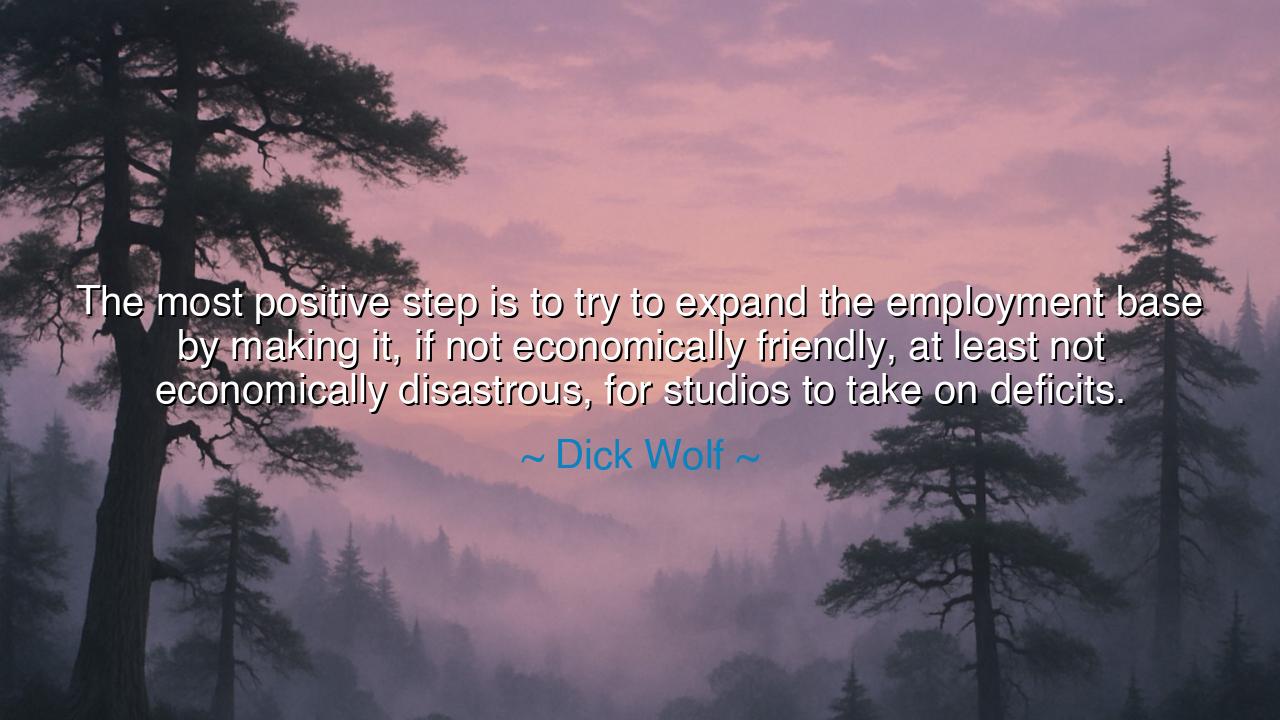
The most positive step is to try to expand the employment base
The most positive step is to try to expand the employment base by making it, if not economically friendly, at least not economically disastrous, for studios to take on deficits.






Dick Wolf, master craftsman of stories that shaped the screens of millions, once declared: “The most positive step is to try to expand the employment base by making it, if not economically friendly, at least not economically disastrous, for studios to take on deficits.” In these words lies not only the wisdom of an artist, but the foresight of a builder of systems. He speaks of employment as the lifeblood of creation, and of deficits not as curses to be feared, but as burdens that can be borne if the path is wisely made. His vision is not for the few who lead, but for the many who labor—the writers, the actors, the artisans—whose hands give life to dreams.
The heart of his teaching is this: prosperity cannot flow when the well is poisoned by fear of ruin. If studios and creators are crushed by the weight of economic disaster, the soil of imagination grows barren, and the multitude is left hungry for both work and story. Thus the “most positive step” is not merely the making of art, but the forging of conditions where art can flourish, where risks can be borne without despair, and where every worker may share in the harvest.
History too speaks in harmony with his words. Consider the bold New Deal of Franklin D. Roosevelt in the time of the Great Depression. The nation was paralyzed by fear of loss, yet Roosevelt knew that without the courage to take on deficits, there could be no rebirth of labor or spirit. By expanding the base of employment, by creating works that renewed both industry and dignity, he turned a season of despair into the foundation of recovery. So too does Wolf remind us that deficit, wisely managed, can become seed rather than stone.
His wisdom is also a rebuke against timidity. To cling only to safety is to stagnate, to guard coins rather than to build kingdoms. The true builder dares to spend where there is hope of growth, and the true leader dares to carry burdens so that many may prosper. Wolf’s words shine with the old truth: that no golden age was born from fear, but from those who sowed boldly in fields others thought barren.
Therefore let this teaching be passed down: do not fear the shadow of deficit, for it is often the price of expansion, the toll to cross into new lands. Fear instead the barrenness that comes when no seed is sown. To expand the base of work, to give hands their labor and hearts their dignity—this is the step most noble, the step most positive, the step that builds futures. For in the end, the wealth of any people is not measured in coins, but in the lives strengthened and the dreams made real.






TQTrang Quynh
The concept of making deficit-taking more manageable for studios is interesting but brings up the challenge of long-term sustainability. Could this actually create a more competitive job market in the industry, or does it open the door to potential financial instability? How do we ensure that job expansion doesn’t come at the cost of quality or long-term viability for production companies?
TMThao My
Dick Wolf’s suggestion seems to advocate for financial flexibility in the entertainment industry. But how does this align with the larger trend of media companies facing tighter budgets and reduced profits? Could this approach create more opportunities for creative productions, or would it lead to a greater reliance on government support and subsidies?
H8Tien Hung 8A1
The idea of making it 'not economically disastrous' for studios to take on deficits raises a crucial question: how do we ensure that such measures truly support employment growth without encouraging reckless financial behavior? Are there more responsible ways to stimulate job creation in the entertainment industry without pushing studios into potentially unsustainable financial situations?
DQPham Thi Diem Quynh
Dick Wolf’s quote emphasizes a need for balance between economic realities and creativity. Should studios be incentivized to take on more financial risks in exchange for job creation, or is this a short-term fix to a larger, systemic problem in the entertainment industry? How can this strategy be sustainable without compromising financial stability in the long run?
NH08_ Ngoc Han
I’m intrigued by the idea of making it easier for studios to take on deficits. Does this mean encouraging riskier investments in new content, or is it more about reducing the financial burden of such risks? How do we ensure that this approach doesn’t end up negatively affecting the quality of productions or the livelihoods of those employed in the industry?